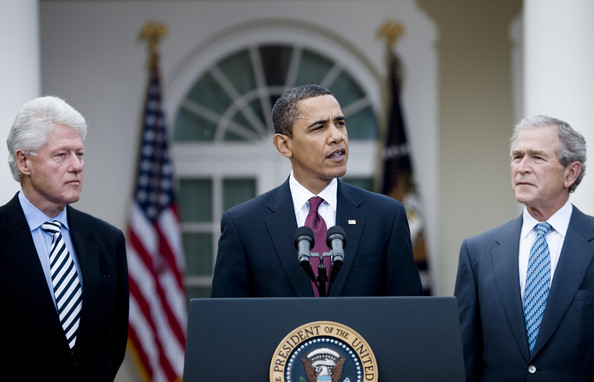by Paul Pillar
Andrew Bacevich has done a tally of the number of countries in the Islamic world that, since 1980, the United States has invaded, bombed, or occupied, and in which members of the American military have either killed or been killed. Syria has become the 14th such country. Several of the countries have been the scene of U.S. military operations more than once. Most of the countries are in the Middle East, although the list also includes Afghanistan and Pakistan in South Asia, Bosnia and Kosovo in the Balkans, and Somalia in Africa. Probably most Americans, however much they may be aware of the latest U.S. military foray, have little appreciation for how extensive this list has become.
Bacevich also notes the sorry record of accomplishment from all this lethal activity, and gives one partial explanation: “American policymakers have repeatedly given in to the temptation to unleash a bit of near-term chaos, betting that longer-term order will emerge on the other end.”
This sort of bet often is placed in response to a desire, and political pressure, to do something about a perceived problem, with military force being the most visible and demonstrable way to “do something.” That is clearly a major part of the Obama administration’s response to the perceived problem of ISIS. The biggest instance of unleashing chaos in the hope that long-term order will somehow emerge, however—the invasion of Iraq in 2003, the operation that gave birth to ISIS under a different name—was not a response to such pressures but instead entirely a war of choice. It was the leading example of the Jerry Rubin school of political-military affairs: of destroying things and then grooving on the rubble.
Several other reasons also account for the miserable U.S. record of military force in that part of the world—of so often making things worse rather than better. One is that although U.S. military force can help to accomplish some really important and beneficial things—such as, say, winning World War II, or in the Middle East, reversing blatant aggression as in Kuwait in 1991—it cannot accomplish many other things, given the nature of those things. The U.S. military is a wonderful hammer, but many of the thorniest problems in the part of the world we are talking about are not nails. Political and social order cannot be injected through the barrel of a gun. Creating a lasting order is about construction; guns are about destruction. Political culture and political will, especially the will to accommodate conflicting interests, are essential to creating order, and they cannot be created with military force.
Much of what needs to be accomplished to create new order needs to be accomplished by those who will be part of that order. Sometimes outsiders can help, but no matter how powerful and well-intentioned an outsider may be, unless a solution is owned by the locals it will not last. That’s what happened with the “surge” in Iraq, which bought a temporary respite from the worst of the violence but failed to accomplish its more fundamental objective of providing the space to enable Iraqi political factions to reach an accommodation.
The current attempt to use force to counter ISIS illustrates in particularly acute form another sort of hazard, which comes from taking sides in someone else’s civil war that is defined in mostly sectarian or ethnic terms. The United States has no national interest in taking sides in such conflicts. It is a prescription for making enemies on one side and getting little better than a “what have you done for me lately” response from the other side.
Not least important, the use of U.S. military force in internal turmoil in the Islamic world has repeatedly fostered resentment and hatred and the sort of anti-American extremism that thrives amid such resentment. This results partly from the collateral casualties and damage that are an almost unavoidable consequence of the application of military force in such situations. It is also partly from the mere fact of the superpower exercising its power in this way. Not putting boots on the ground helps to lessen this response, but dropping bombs on the ground isn’t really better.
Several political and military dynamics, including the desire to double down on a bet that hasn’t yet paid off, may drive escalation of the latest U.S. military effort in the region. Taking a larger perspective, something similar has been happening regarding the whole multi-decade U.S. military encounter with the Middle East. There is a strong inclination to believe that whatever is the current chapter in that encounter will bring the sort of payoff that previous chapters did not. Don’t bet on it.
Paul Pillar is on the faculty of the Security Studies Program at Georgetown University. Concluding a long career in the Central Intelligence Agency, he served as National Intelligence Officer for the Near East and South Asia from 2000 to 2005. This article was first published by the National Interest and was reprinted here with permission.






Interesting post, to which I add : “what an arrogant bunch of idiots running this country”. There doesn’t seem to be any coherent planning except blowing up the infrastructure, as Israel has demonstrated in Gaza. As far as any sort of rebuilding goes, $Billions are paid out, but what ever is built, either doesn’t work or isn’t finished, but lines the pockets of the corrupt, from the top down. Let’s not forget the innocent civilians who are collateral damage too. As usual. the U.S. has been suckered into fighting others war[s].
Someone mentioned that Israel has a plan called Samson, where it will incinerate the M.E. and perhaps beyond with Nuclear bombs, as in blackmail directed at the Western world, especially the U.S. That poses a moral question, is the world going to allow Israel to get away with such? Considering the population differences, it boggles the mind to think Israel can call the shots for the rest of humanity, especially when it shows such disregard for the Palestinians.
Getting a bit carried away there Norman! Israel isn’t going to use nukes, unless faced with imminent oblivion, because living next to irradiated territory carries unacceptable risks.
All wars, regardless of length, are futile.
Gee Mike, are you aware of this “Samson” issue? As for getting carried away, if you read what I said about that, then your response reads more like that fairy dust thing “O” uses. Perhaps it’s the blogs fault, you & I read, different, yet with their own point of view. I can understand your taking the position you seem to be taking, if you believe in the Israeli view. But, considering the past performance, then it’s not out of character for what I repeated to be true. But then, that’s what makes this forum what it is, sharing views, pro & con, within reason of course. Thanks for your reply.
It is in human nature – when you loose what you have built and have been dear to you you rebel. I remember a scene from old Slovak movie about Nazis’ occupation of Slovakia when the most rational and docile character of them all is taking backpack full of explosives to destroy supply line of occupier in the railway tunnel in what we would call now suicide-bombing. He had lost his dear son in the war, his house was destroyed by accident but because of war.
More violations of daily lives of people under attack – more hatred for perpetrator is growing in the hearts of civilians.
Seymour Hersh had a bit of a reputation for sensational stories. But I don’t doubt that the Samson option has been discussed. If you are cornered by a gang of killers, it is considered a good ploy to say “I know you will win, but I will take a few of you with me. Who wants to be first?”
But that is a long way from saying that Israel is considering a preemptive nuclear strike.
I don’t approve of Israel’s foreign policy, but I see them as devious and calculating rather than completely insane.